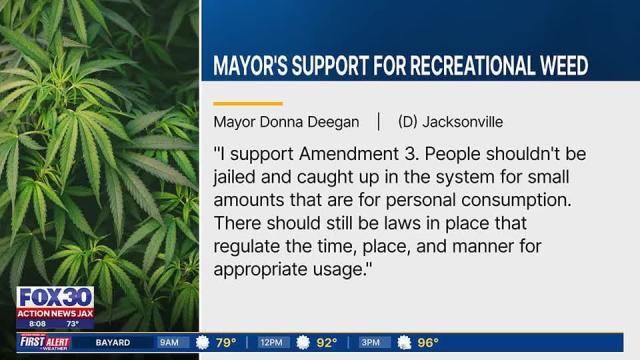As the November general election draws closer, Jacksonville leaders are divided over one key ballot item: Amendment 3—the legalization of recreational marijuana for those 21 years and older. The measure has sparked widespread discussion among residents and officials, with opinions varying on its potential benefits and risks. Action News Jax breaks down what residents and community leaders are saying, alongside the facts and implications surrounding the proposed amendment.
Interviews conducted by Action News Jax on Sunday morning indicated strong support for the amendment among Jacksonville residents.
Vaneshia Smith, a resident voiced her approval stating, “What’s the issue with me smoking my marijuana and you got your cigarettes, you know? But yeah, I feel like we need it.”
Similarly, Alex Grap commented, “There’s a lot of other things that are commonplace, drinking for example. You don’t really see a corner without a bar. And I don’t think this is much different than that.”
On the political side, Jacksonville Mayor Deegan publicly endorsed the measure on Saturday, arguing that criminalizing marijuana for personal use has disproportionately impacted communities and that reform is overdue.
“I support Amendment 3. People shouldn’t be jailed and caught up in the system for small amounts that are for personal consumption,” said a spokesperson for Deegan in a statement to Action News Jax. “There should still be laws in place that regulate the time, place, and manner for appropriate usage. All in all, people should be free from government interference if they aren’t putting the public in danger or disrupting the community.”
Supporters of Amendment 3 also highlight the economic advantages, such as job creation, increased tax revenue, and the regulation of a currently illicit market. A 2023 state report suggested that legalizing recreational marijuana could generate over $195 million annually in state and local tax revenues, although the allocation of these funds remains uncertain.
However, not all leaders are in favor. Jacksonville Sheriff TK Waters strongly opposed Amendment 3 during a town hall meeting on Thursday, citing potential public safety risks.
“As a 33-year law enforcement officer and your elected Sheriff, I will always oppose policies that put the health and safety of Jacksonville’s children and families at risk, including Amendment 3,” said Waters in a statement. “In states where marijuana has been legalized recreationally, we’ve seen a rise in drugged driving incidents, an increase in emergency room visits, and a surge in marijuana-related crimes. The negative consequences on public safety are clear. Amendment 3 will lead to more addiction, impaired driving, and crime. It will make neighborhoods and roadways less safe and our families less healthy. For these reasons, I strongly oppose Amendment 3 and urge our citizens to do the same.”
In response to Sheriff Waters’ concerns, a study by the Insurance Institute for Highway Safety found that while traffic incidents have risen in some states with legalized marijuana, the link between marijuana use alone and increased crash risk is uncertain, particularly when not combined with alcohol. Additionally, initial spikes in emergency room visits due to edibles have generally stabilized over time, with awareness playing a significant role. Crime data also show mixed results, with some areas experiencing decreases in drug-related arrests after legalization, suggesting that the impact on public safety varies.
One significant concern for officials is the potential risk to children, especially with the availability of marijuana edibles that resemble common candies or snacks.
Mike McCormick from Jacksonville’s Poison Control offices highlighted these dangers, noting, “The number of THC poisonings of young children skyrockets. When you start making these sweet treats, they become very enticing to a child.”
He stressed that if Amendment 3 passes, it will become the responsibility of adults to secure these products out of reach of children and pets. He also called for strict state regulations on packaging to ensure that marijuana edibles or products are not easily accessible or appealing to minors.
“When the dispensaries are selling them, what responsibilities do they have in tamper-proof packaging? What responsibilities do they have in child-resistant packaging that goes out there? What are the advertising rules going to be? So there’s a lot to look at in this,” McCormick stated.
As the debate continues, polling remains conflicted over whether Amendment 3 will pass in Florida. A recent Suffolk University & USA Today poll suggests that the amendment could pass, with 63% of respondents expressing support. However, a Florida Atlantic University poll shows a narrower margin, with only 56% of respondents in favor, potentially falling short of the 60% needed for approval.
H/T: www.yahoo.com



